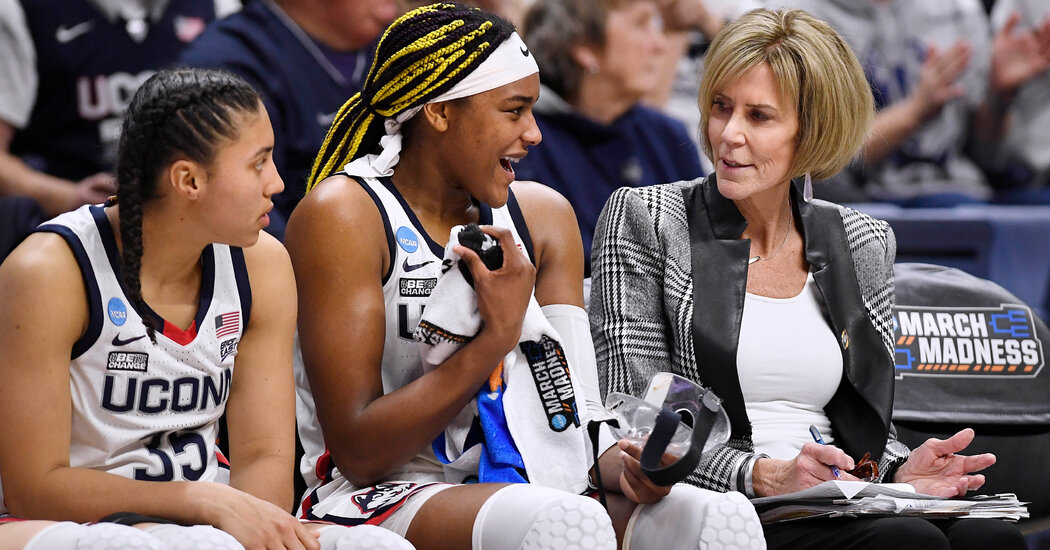
STORRS, Conn. — Chris Dailey is a woman of routine.
She runs practices like clockwork. She delivers her locker room pep talks with efficiency. And she adheres to a strict schedule in the morning before heading to the University of Connecticut: She gets up, works out and goes to Panera Bread.
“It’s a little embarrassing — I used to get their iced tea but I don’t really like it, so now I make my own and I just go there because I like their cups, and I have people there that I talk to,” Dailey, 63, said recently, adding in a near-whisper: “I really just get the ice there.”
On game days, the coach whom players call “C.D.” fills her cup with a special treat: Diet Coke. She’ll bring it with her onto the court and tape over the brand’s name “so we don’t get in trouble,” she said.
For 38 years, Dailey’s routines have kept the Connecticut women’s basketball program running at full steam. She is the yin to Coach Geno Auriemma’s yang, the steady voice to his occasional courtside outbursts, the structure to his more fluid approach. The two couldn’t be more different — he arrives five minutes before a plane is scheduled to take off, she prefers not to travel with him anymore — but together, they have transformed the Connecticut program, and with it, women’s basketball at large.
“The way that we are, the one unit that we are, that’s all C.D.,” said the sophomore guard Caroline Ducharme. “She’s the leader in that and I think a big reason that UConn has the image that it has.”
Auriemma hired Dailey as an assistant coach in 1985, as soon as he arrived in Storrs, and promoted her to associate head coach in 1988, a role she has filled ever since, with a focus on post players, academics and overall recruitment. Together, Auriemma and Dailey have coached more than 40 all-American players, reached 22 Final Fours, won 11 championships, recorded six perfect seasons (including an 111-game winning streak) and sent nearly 40 women to the W.N.B.A., including Rebecca Lobo, Sue Bird, Diana Taurasi, Breanna Stewart, Swin Cash and Maya Moore.
The numbers can be dizzying.
“When I hear the numbers, I think, that’s unbelievable, and if I didn’t live it, I might not believe it,” Dailey said.
On Saturday, Connecticut will make its 29th consecutive appearance in the N.C.A.A. tournament’s round of 16 after one of the most difficult seasons in program history. Injuries, illness and missed games — including by Auriemma and Dailey — followed the Huskies all year, right up to their Big East tournament title earlier this month. Dailey herself was taken off the court in a stretcher after collapsing during a game in November.
“We tell the kids, there are no bad teams left, only good teams are remaining, and we have to play well in order to advance,” Dailey said. “If we do that, then we give ourselves a chance.”
Dailey has been part of a “good team” for longer than many of her players have been alive. She played basketball in high school in New Brunswick, N.J., and then at Rutgers, where she won a national championship. She went on to coach as an assistant at Cornell and Rutgers before arriving at Connecticut.
But the Auriemma-Dailey team was never a sure thing. In fact, Dailey didn’t know if she would make it through the first summer training camp. But, a decade in, they won their first championship title, defeating the Tennessee Lady Vols in 1995. A new chapter in women’s basketball was born.
After the Huskies’ win, Mickie DeMoss, a friend and assistant coach for Tennessee, pulled Dailey aside to tell her that Tennessee would have to start playing basketball differently now.
“I said to Geno, ‘You’re not going to believe this — Tennessee is going to change their style of play because of us,’” Dailey said. “We didn’t want to be just a one-hit wonder. That next year, I felt more pressure in terms of recruiting and wanting to win. We wanted to sustain it.”
Dailey said Auriemma absorbs that pressure on behalf of the team. She tries to add a bit of levity where she can; jokes and sarcasm run deep on the coaching bench, especially among basketball’s odd couple.
“C.D. is definitely always taking care of us, making activities for us, taking us to pedicures,” said Dorka Juhász, a forward who transferred to Connecticut from Ohio State. “We’re college kids, we’re doing a lot of basketball, but also, you know, she’s trying to balance it to see the world a little bit.”
That balance sometimes swings the other way.
Asjha Jones, who played at UConn from 1998 through 2002, with the likes of Bird and Cash, remembered one particularly grueling practice after “a bunch of us kept mishandling the ball.” Dailey lined up her post players and started throwing “bullets at us, throwing them to the sky, drilling at us,” Jones said. “She takes it personally, we’re a reflection of her.
“Looking back, you’re like, damn,” Jones continued with a laugh. “But guess what: We didn’t drop any more passes that year.”
Dailey recruited Jones out of high school, and the two New Jersey natives hit it off immediately.
“She was one of the few people who understood me and knew how to talk to me,” said Jones, a two-time W.N.B.A. All-Star who is now the director of basketball strategy for the Portland Trail Blazers. “She didn’t sugarcoat anything, didn’t give me any fluff.”
Dailey and Auriemma have fallen into what Dailey calls a “divorced parents” rhythm. If a player doesn’t receive the answer they’re looking for from one of them, they’ll go to the other coach. But one thing is consistent: They both hold themselves and the Huskies program to a high standard.
“I’ve always appreciated the fact that he’s allowed me ownership of this program and appreciated how he gets to his spot,” Dailey said of Auriemma.
Auriemma, for his part, knows his team is in good hands.
“It’s unique that she’s able to spend that much time here and be able to put her stamp on the program in every way,” he said, adding that, if he left for the summer, the team would be better organized and “things would be in a much better place if she was in charge.”
Dailey, who was inducted into the Women’s Basketball Hall of Fame in 2018, knows that she is “closer to the end than I am to the beginning,” but she’s not done with her routines yet. Maybe that’s when everything that the program has accomplished will sink in.
“I don’t think you ever really think about legacy until it’s over,” she said. “I don’t think I will think about that until I’m retired — and I still have a few good years left in me.”
Auriemma and Dailey will both know when it’s time, “whether it’s together or separate — we’re certainly not twins,” Dailey said. “It would be in some ways fitting for us to leave together, but we’re certainly two individuals that have our own minds and situations.”
Dailey was hesitant to say whether she would step into the role if Auriemma were to step down first — “I don’t think about that other stuff” — but said she didn’t see that happening.
“Circumstances have a lot to do with a lot of things,” she said. “Right now, we’re excited about the future.”

